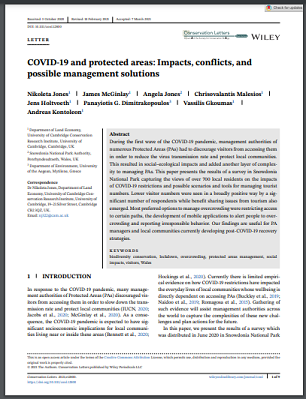
During the first wave of the COVID-19 pandemic, management authorities of numerous Protected Areas (PAs) had to discourage visitors from accessing them in order to reduce the virus transmission rate and protect local communities. This resulted in social–ecological impacts and added another layer of complexity to managing PAs. This paper presents the results of a survey in Snowdonia National Park capturing the views of over 700 local residents on the impacts of COVID-19 restrictions and possible scenarios and tools for managing tourist numbers. Lower visitor numbers were seen in a broadly positive way by a significant number of respondents while benefit sharing issues from tourism also emerged. Most preferred options to manage overcrowding were restricting access to certain paths, the development of mobile applications to alert people to overcrowding and reporting irresponsible behavior. Our findings are useful for PA managers and local communities currently developing post-COVID-19 recovery strategies.














